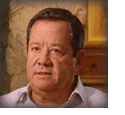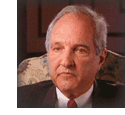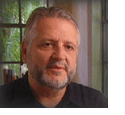



A political commentator and a moderate
I must confess that I do not believe very much whenever these Cuban exiles
talk about freedom in Cuba or anywhere else, because they have used their power
in Miami to accomplish everything except freedom for everybody in Miami. There
is no freedom of expression within the Cuban community. The few free
expressions freely expressed here through the media usually have come at a high
risk, and usually through very specialized efforts to get some type of
commercials to back it up. Whenever they talk about diversity of opinion,
democracy or freedom, they don't mean it. Basically, what they have done is
eliminate the American Constitution from Miami.
...They use Cuba as a political thesis behind which they hide, in order to
amass more and more power here. They have enough support behind them to elect
politicians. Those politicians give them contracts, so they can make more
money. When they make more money they can contribute more to elect more
politicians. That is why I call them an industry. They have created here a
very complex situation.




Senior research associate at the North-South Center at
University of Miami
Even though the hard-line exiles lost the Elián battle, they've
shown that they still have the capacity to throw a wrench in the rational
resolution of any problem between the United States and Cuba. When you look at
problems like the Palestinian-Israeli problem, you see that there is some hope
of resolution, whereas the Cuba-US exile situation doesn't seem to be going
towards negotiation. You ask, why is that? Not that many Americans have died
in the fight over Cuba. Repression in Cuba has been bad, but you can't compare
it to what's happened in many other countries that have been able to come to
terms with their past. A million people died in the Spanish Civil War, and
they were able to move on after some decades. I think one of the reasons is
that this is a game involving three players. And triads are tough and troubled
in politics, like in love. Anybody can throw a wrench in this machinery.
Who are the triad?
Cuba, the exiles, and the US government. We have seen time and again, where
there seems to be progress in a particular area, or it looks like the US is
finally going to lift some significant part of the embargo, the exiles weigh in
with all their lobbying muscle and stop it. In some cases, it's looked like
Cuba has thrown a wrench into the machinery.
Another interpretation is that the exiles have provoked the Cuban government
into throwing the wrench, such as with the Brothers To The Rescue flight. What
you have is more possibilities of conflict than when you only have two parties.
That's one reason I think we haven't moved further along the road of
negotiations. And the Elián saga, involving these three parties in a
very, very clear fashion, brings it out very well. Ironically, the odd party
out was the exile group. They have traditionally had difficult, but in the
end, cooperative relations with Washington and conflictual relations with
Havana. In this case, it turned out that Havana and Washington were converging
on the same policy, while the exiles were protesting all the way.




A Baptist pastor and president of the Miami-Dade County
NAACP
... There's a band [from Cuba] that came over here, Los Van Van. The
Cuban-Americans went crazy over that. That's music. Music used to be the
universal language. But they even politicize that. . . .
There is so much intimidation in Miami-Dade. A friend of mine, a Cuban man,
has a store. And when they decided to do that shutdown of all of the
businesses, he called me and literally, he was about to cry on the phone. He
said, "Bishop, my father brought me over here at the age of seven. He told me,
'I brought you here so that you could have the freedom to make choices.'" My
friend said, "I want to keep my business open, because 95 percent of my
clientele is African-Americans, and that would be a slap in their face. The
only reason why I'm even thinking about closing is because I've received phone
calls. I've been threatened. They say that my store will be blown up or that
there will be some kind of distraction or disturbance outside my store."
What did he do?
He kept his store open. ... It's a lot of intimidation. There are a lot of
younger Cubans who would speak against this, but they're afraid of the
repercussions.
What about the Anglos who won't talk about it at all?
I'm a man of faith. I really, really believe that God will bless me if I speak
truth. If you suppress truth, if you don't speak truth, then we won't be free.
I'm not intimidated by any of them. I've had death threats. I've had people
call. I'm not speaking against them, I'm giving my opinion. And I found out
that this is the opinion of a lot of whites, and this is the opinion of a lot
of blacks. And guess what? This is also the opinion of a lot of Cubans.
But they don't say it in public.
They're afraid. My church here; it's a melting pot. But I do not rely on
Cuban-Americans for our sustenance, and that's why I can speak freely. They
[the Cuban exiles] don't advertise on our radio station, so I'm not going to
lose any advertising dollars. They don't come to this church and contribute,
so I'm not going to lose that. I can speak the truth. I've sat down with the
mayor several times. I've said to him, "The only thing that African-Americans
really need and want is to feel that the mayor will include everybody." A lot
of my Anglo brothers and sisters don't feel that they're a part of Miami-Dade
anymore. I could take the other side and say the Anglos are reaping what they
sow because of how they treated us when they were in power. When they were in
power, they treated black people bad. Now Cubans are in power in the city of
Miami.




Former president of the Bay of Pigs Veterans Association
and a moderate
They've been able to stifle most legislation, most political activity, that
has had any inclinations of normalizing relations with Cuba. They've been
able to influence Congress and the administrations to create legislation like
the Torricelli bill, the Helms-Burton bill, which basically try to strangle the
Cuban economy. In fact, what it's strangling is the Cuban people. It has made
the Cuban government stronger. It has made it look like the United States have
been bullying the Cuban government. It has given it tremendous support
internationally.
They've been able to achieve that because they had political power, and
because the rest of the country really didn't care much about what's happening
in Cuba. They said, "That's a Cuba issue, let's leave it to the Cubans, let's
leave it to the best judgment of the two or three Cuban people in Congress."
In this Elián case, this whole thing has come unraveled. The United
States and other countries have, for the first time, focused once again on Cuba
and on the Cuban problem. And what they have seen is that the US policy
towards Cuba for the past 40-some years has not worked, is not working, and it
will not work in the future. It has shown the Cuban community in Miami, a
segment of it, is very irrational and very arrogant.




A professor at Florida International
University,where he founded the Cuban Research Institute.
I think the Cuban exiles have had a lot of influence on US policy towards Cuba
in the past, because nobody cares in the US; nobody has Cuba on their radar
screen. It's possible that most of the chief executives of the Fortune 500
companies would want to change policy towards Cuba and allow commerce with
Cuba. But if they had 30 minutes with the president of the United States,
they're not going to talk about Cuba. And so there hasn't been a real
concerted effort on the part of those people who would favor a lifting of the
embargo and new relations started with Cuba.
Whereas for Cuban-Americans, that's their priority. They have lobby
organizations. They have a committed congressional group of three
Cuban-American congressmen who make that their priority. And so they
represent a very dynamic force in favor of keeping US policy. On the other
side, you don't have anybody with a lot of weight committed in this country to
change US-Cuba policy, and therefore it hasn't changed.


home · analyses · interviews · timeline · discussion
video excerpt · links · readings · synopsis
tapes & transcripts · press · credits
frontline · wgbh · pbs online
web site copyright WGBH educational foundation
top photo © afp/corbis
 |  |